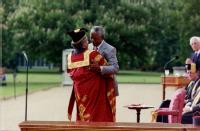Nelson Mandela Awarded Honorary Degree at special Buckingham Palace Ceremony
  |
Originally Published July 1996
Nelson Mandela, the State President of South Africa,awarded an honorary degree by the University of Warwick at a special ceremony in Buckingham Palace on Wednesday July 10th 1996.
He received his honorary degree (Doctor of Laws - LLD) from the University of Warwick's Chancellor, the former Secretary-General of the Commonwealth, Sir Shridath Ramphal. As Secretary-General Sir Shridath played a significant role in shaping Commonwealth policy towards apartheid South Africa.
The ceremony was held in Buckingham Palace to allow a small group of UK universities to each present President Mandela with an honorary degree from their respective institutions. A short biography of President Mandela follows:-


President Nelson Mandela: Biographical Note
Nelson Mandela was born at Qunu, near Umtata on 18 July 1918. His father, Henry Mgadla Mandela, was chief councillor to Thembuland's acting paramount chief David Dalindyebo. When his father died, Mandela became the chief's ward and was groomed for the chieftainship.
Mandela matriculated at Healdtown Methodist Boarding School and then started a BA degree at Fort Hare. As an SRC member he participated in a student strike and was expelled, along with the late Oliver Tambo, in 1940. He completed his degree by correspondence from Johannesburg, did articles of clerkship and enrolled for an LLB at the University of the Witwatersrand.
In 1944 he helped found the ANC Youth League. He was also elected national volunteer-in-chief of the 1952 Defiance Campaign. He was given a suspended sentence for his part in that campaign. Shortly afterwards a banning order confined him to Johannesburg for six months. During this period he formulated the "M Plan", in terms of which ANC branches were broken down into underground cells. Mandela has held numerous positions in the ANC: ANCYL secretary (1948); ANCYL president (1950); ANC Transvaal president (1952); deputy national president (1952) and ANC president (1991).
By 1952 Mandela and Tambo had opened the first black legal firm in the country. A petition by the Transvaal Law Society to strike Mandela off the roll of attorneys was refused by the Supreme Court. When the ANC was banned after the Sharpeville massacre in 1960, he was detained until 1961 when he went underground to lead a campaign for a new national convention.
After a period in Algeria, Mandela returned to South Africa but was immediately arrested for leaving the country illegally and for incitement to strike.. He was convicted and jailed for five years in November 1962. While serving his sentence, he was charged with sabotage and sentenced to life imprisonment. Robben Island, where he was imprisoned, became a centre for learning, and Mandela was a central figure in the organised political education classes. He was eventually released on Sunday 11 February 1990. He was inaugurated as State President of South Africa on 10 May 1994.
Click here for a Longer Biography from the ANC's site.
